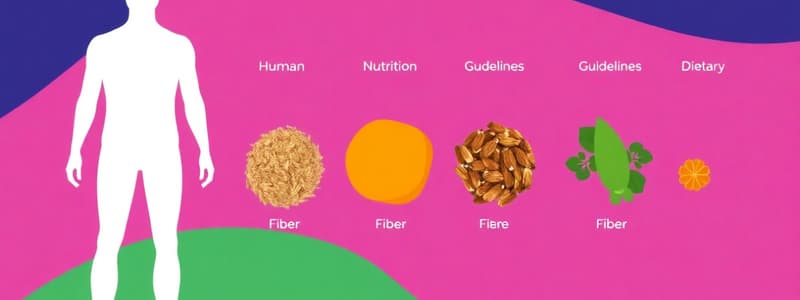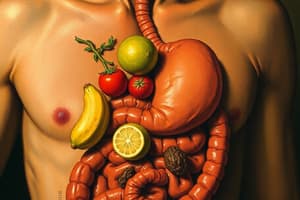Podcast
Questions and Answers
What is a primary health benefit of soluble fiber?
What is a primary health benefit of soluble fiber?
- Prevents diverticular disease
- Alleviates constipation
- Protects against heart disease (correct)
- Promotes bowel movements
Which food source is rich in insoluble fiber?
Which food source is rich in insoluble fiber?
- Whole grains (correct)
- Citrus fruits
- Oats
- Legumes
What characteristic differentiates soluble fiber from insoluble fiber?
What characteristic differentiates soluble fiber from insoluble fiber?
- Insoluble fiber is associated with diabetes protection
- Soluble fiber is fermented in the colon (correct)
- Insoluble fiber is easily digested by bacteria
- Soluble fiber does not form gels in water
Which of the following is NOT a focus area in the principles of human nutrition?
Which of the following is NOT a focus area in the principles of human nutrition?
What dietary guideline emphasizes a balanced intake of food?
What dietary guideline emphasizes a balanced intake of food?
What is a major role of lipids in the human body?
What is a major role of lipids in the human body?
Which of the following is a common trend in dietary intake?
Which of the following is a common trend in dietary intake?
Which statement about fatty acids is correct?
Which statement about fatty acids is correct?
How can food influence our daily functioning?
How can food influence our daily functioning?
Which nutrient is essential for normal bone development?
Which nutrient is essential for normal bone development?
What is the main function of nutrients in the body?
What is the main function of nutrients in the body?
Which of the following foods are considered high glycemic index foods?
Which of the following foods are considered high glycemic index foods?
Which of the following is NOT one of the six categories of nutrients?
Which of the following is NOT one of the six categories of nutrients?
Which nutrient category typically provides the highest percentage of energy in an adult diet?
Which nutrient category typically provides the highest percentage of energy in an adult diet?
What defines a positive energy balance in terms of energy intake and expenditure?
What defines a positive energy balance in terms of energy intake and expenditure?
What distinguishes macronutrients from micronutrients?
What distinguishes macronutrients from micronutrients?
Which component is essential for correcting problems caused by disease or injury?
Which component is essential for correcting problems caused by disease or injury?
What is the primary characteristic of dietary fibers?
What is the primary characteristic of dietary fibers?
Which of the following nutrient types are considered inorganic?
Which of the following nutrient types are considered inorganic?
What defines a nutrient as essential?
What defines a nutrient as essential?
Which of the following statements about minerals is true?
Which of the following statements about minerals is true?
Which statement about proteins is correct?
Which statement about proteins is correct?
What can be classified as a source of low glycemic index foods?
What can be classified as a source of low glycemic index foods?
Which of these is a common source of dietary fats?
Which of these is a common source of dietary fats?
Which of the following is considered a complex carbohydrate?
Which of the following is considered a complex carbohydrate?
How do medium glycemic index foods affect blood sugar levels?
How do medium glycemic index foods affect blood sugar levels?
Flashcards
Nutritional Science
Nutritional Science
The study of how food affects our bodies, including how it provides nutrients and energy, and its impact on health.
Energy Intake
Energy Intake
The amount of energy we take in from food.
Energy Balance
Energy Balance
The balance between the energy we take in and the energy we use.
Macronutrients
Macronutrients
Signup and view all the flashcards
Micronutrients
Micronutrients
Signup and view all the flashcards
Nutrients
Nutrients
Signup and view all the flashcards
Essential chemicals
Essential chemicals
Signup and view all the flashcards
Six categories of nutrients
Six categories of nutrients
Signup and view all the flashcards
Energy-yielding nutrients
Energy-yielding nutrients
Signup and view all the flashcards
Proteins
Proteins
Signup and view all the flashcards
Vitamins
Vitamins
Signup and view all the flashcards
Minerals
Minerals
Signup and view all the flashcards
Water
Water
Signup and view all the flashcards
Positive energy balance
Positive energy balance
Signup and view all the flashcards
Negative energy balance
Negative energy balance
Signup and view all the flashcards
Glycemic Index (GI)
Glycemic Index (GI)
Signup and view all the flashcards
Dietary Fiber
Dietary Fiber
Signup and view all the flashcards
Soluble Fiber
Soluble Fiber
Signup and view all the flashcards
Insoluble Fiber
Insoluble Fiber
Signup and view all the flashcards
Fatty Acids
Fatty Acids
Signup and view all the flashcards
Triglycerides
Triglycerides
Signup and view all the flashcards
Phospholipids
Phospholipids
Signup and view all the flashcards
Study Notes
Nutritional Science Study Notes
- Nutritional science is the study of how food affects our bodies
- Food has an impact on our daily functioning
- Nutrients are chemical substances in food
- Food provides energy, nutrients, and other substances for growth and health
- Health problems are related to nutrition and originate within cells
- Poor nutrition can arise from inadequate and excessive levels of nutrients
- Humans have adaptive mechanisms to manage fluctuations in food intake
- Malnutrition can stem from poor diet, disease, genetic factors, or combinations
- Some groups of people are more vulnerable to malnutrition than others
- Poor nutrition can contribute to chronic disease development
- Healthy eating is characterized by adequate intake, variety, and balance
- There are no inherently "bad" or "good" foods
Nutrients
- Food is a mixture of chemicals and essential chemicals are nutrients
- Six categories of nutrients: carbohydrates, lipids (fats and oils), proteins, vitamins, minerals, and water
- Carbohydrates are single or multiple sugar molecules in various forms
- Proteins are made up of amino acid chains
- Fats are soluble in fat but not water and are often referred to as lipids
- Vitamins are 13 essential chemicals performing certain functions
- Minerals are 15 elements performing specific functions in the body
- Water is essential to the body
Macronutrient Energy Provisions
- For a typical 2,000-calorie diet, carbohydrates should provide 45-65% of the calories
- Fats should comprise 20-35% of the calories from saturated and unsaturated fats
- Protein should contribute 10-35% of the calories
Energy Balance
- Energy balance is calculated by subtracting total energy expenditure from total energy intake
- Energy intake and expenditure need to be balanced in order to maintain normal bodily functions and weight
- Positive energy balance results in weight gain; energy in > energy out
- Negative energy balance results in weight loss; energy in < energy out
- The energy in food is measured in kilocalories (kcal)
Carbohydrates (CHO)
- Carbohydrates are the primary source of energy in human diets worldwide.
- They contain carbon, hydrogen, and oxygen
- They are the brain's primary source of energy.
- Carbohydrates are classified as monosaccharides, disaccharides, and polysaccharides
- Monosaccharides: include single sugars like glucose, fructose, and galactose
- Disaccharides: composed of two monosaccharides, such as sucrose, lactose, and maltose
- Polysaccharides: large molecules formed by chains of monosaccharides, such as glycogen, starch, and fiber
Lipids
-
Lipids are chemical substances composed of carbon, hydrogen, and oxygen.
-
They are important for fat-soluble vitamin absorption.
-
Lipids are generally insoluble in water but soluble in organic solvents
-
Lipids include fatty acids, triglycerides, phospholipids, and sterols
-
Fatty acids are organic acids composed of carbon chains with hydrogen atoms and an acid group at one end and a methyl group at the other
-
Triglycerides are lipids composed of a glycerol backbone and three fatty acids
-
Phospholipids have a phosphate group in place of one fatty acid in triglycerides
-
Sterols contain multiple ring structures. Cholesterol is a type of sterol
-
Fatty acids are classified based on their degree of saturation: Saturated, monounsaturated, and polyunsaturated fatty acids.
Proteins
- Proteins are composed of amino acids and are an important component of our diets
- Proteins from animal sources (meat, poultry, fish) are considered higher quality than plant sources (grains, vegetables).
- Protein is important for many bodily functions and for maintaining muscle mass
Vitamins and Minerals
- Vitamins are micronutrients and are crucial for various bodily functions
- Vitamins are classified as either water-soluble or fat-soluble
- Minerals are also micronutrients and are crucial for various bodily functions
- Individual vitamins and minerals have distinct roles in health and support bodily processes
Nutritional Assessment
- Nutritional assessment is a process to diagnose nutritional deficiencies in individuals and can include anthropometric (measuring physical features), biochemical (testing body fluids), clinical (observing signs and symptoms) and dietary assessments.
Dietary Patterns to Manage Diseases
- Several dietary patterns are recommended, such as the Mediterranean diet, low-fat diets, DASH diet and vegetarian diet, to lower the risk of cardiovascular diseases
Dietary Management Methods
- Dietary management methods include 24-hour recall, food record, and food frequency questionnaire.
Eating Disorders
- Eating disorders are serious illnesses involving severe disturbances. They include anorexia nervosa, bulimia nervosa, and binge eating disorder
Nutritional deficiencies
- Some nutritional deficiencies can affect many body functions, such as anemia, which can cause weakness or fatigue.
Malnutrition
- Malnutrition can occur from a lack of sufficient or excessive nutrients
- It can cause various health problems and may lead to decreased energy and strength, and issues with wound healing
Dietary Guidelines
- Dietary guidelines outline guidelines to follow for good health
- Guidelines recommend eating patterns for good health
- These recommended diets generally focus on sufficient intake and a balance of multiple food groups
Studying That Suits You
Use AI to generate personalized quizzes and flashcards to suit your learning preferences.





